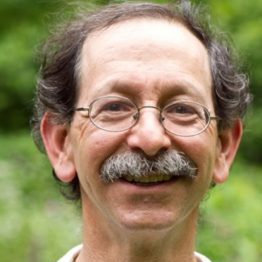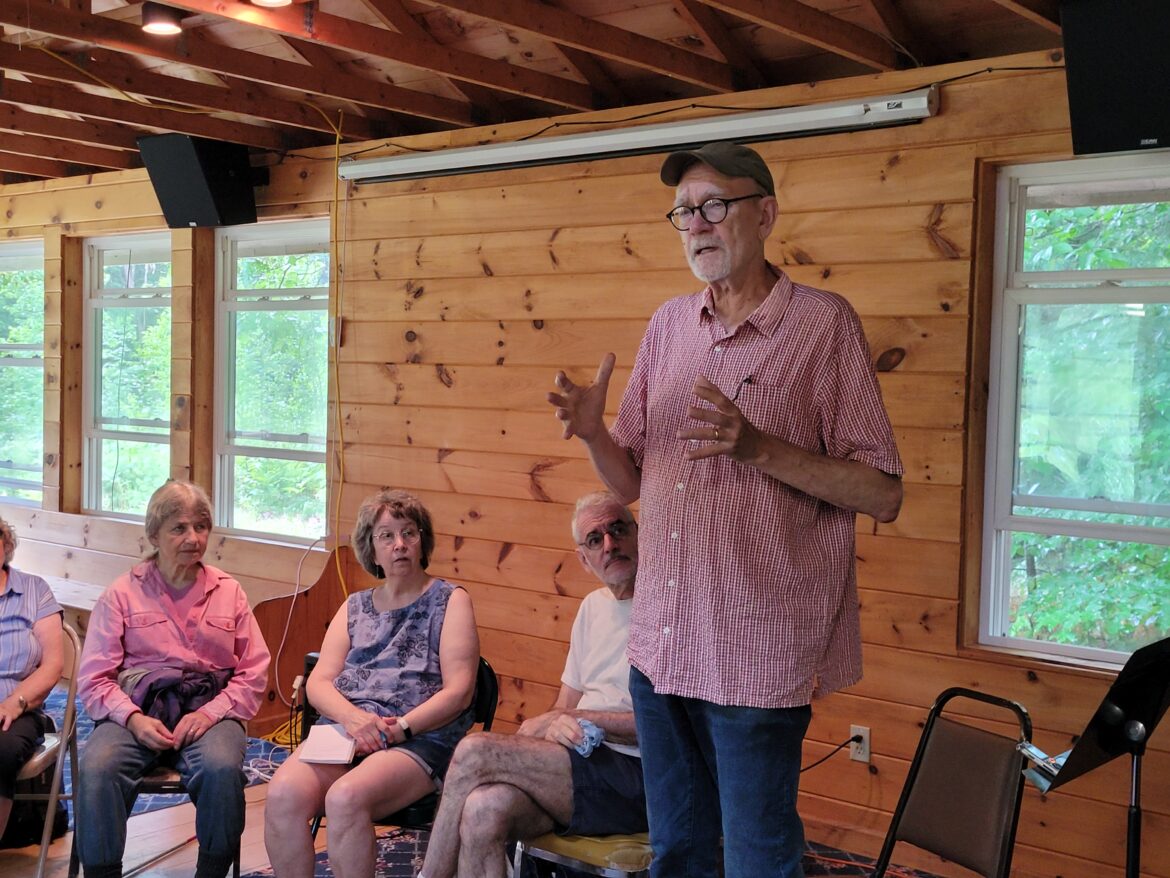Nukes are a Wasteful Diversion from Climate Solutions

By ARNIE ALPERT, Active with the Activists
It’s been 47 years since he was first arrested protesting the Seabrook nuclear plant, and over three decades since he relocated to the DC Beltway, but Paul Gunter still has New Hampshire on his mind.
While keeping an eye on the alkali-silica reaction that has caused micro-fractures in the concrete underneath Seabrook’s operating reactor, he’s paying attention, too, to a legislative study committee that is aiming for a Granite State nuclear revival.
The study committee, operating largely out of the public eye, is officially titled the “Commission to Investigate the Implementation of Next Generation Nuclear Reactor Technology in New Hampshire.”
Gunter calls it the “Commission to Implement More Exorbitantly Expensive and Inherently Dangerous Nuclear Power.”
The study group’s members include several Republican legislators, one of whom worked at the Seabrook nuclear plant; a lobbyist for a “consumer group” that counts Exxon/Mobil and the Nuclear Industry Institute among its members; Seabrook Station’s regulatory affairs manager; and representatives of Sununu’s administration agencies. They have been meeting since last fall.
In addition to its official records, the commission has its own unofficial website which declares, “Now is an opportune time to revisit nuclear power to determine the current state of technology and possible applications for energy production in New Hampshire during the coming decade.”
The bill which created the commission begins, “Eliminating carbon emissions from electricity generation is an urgent goal to mitigate the threat of climate change.” That’s a good start, especially from legislators and an administration perceived at best as climate change skeptics. But the commission is only examining the nuclear option. Guest speakers have primarily come from private businesses touting the promise of their own technology, nuclear boosters from federal agencies, and representatives from the industry’s main trade group, the Nuclear Energy Institute (NEI).
The one “independent journalist” who spoke to the commission is a former NEI policy analyst.
At the commission’s most recent meeting, with guest speakers from the U.S. Department of Energy’s Office of Nuclear Energy, members talked about the possibility of receiving federal money to convert the site of the Merrimack Station power plant in Bow from burning coal to splitting atoms. Coal to Nuclear, or C2N, is a project of the DOE’s Gateway for Accelerated Innovation in Nuclear (GAIN) program, which was begun by President Barack Obama in 2015 with nearly a billion dollars in startup funds. One C2N study concluded that “80% of retired and operating coal power plant sites that were evaluated have the basic characteristics needed to be considered amenable to host an advanced nuclear reactor.” GAIN staff have confirmed by email that Merrimack Station is among the plants they have studied.
New Hampshire is not alone. Other states, including Colorado, Indiana, Kentucky, Michigan, North Dakota, South Dakota, and West Virginia, have also created or mandated studies to promote new nuclear power plants.
Gunter is having none of it.
As co-founder of the nonprofit advocacy group, Beyond Nuclear, and director of its Reactor Oversight Project, he has already spent years poking holes in the nuclear industry’s promise that it was about to undergo a renaissance. Gunter believes nukes are no more an answer to the climate crisis than they were a technological savior back in the 1950s, when AEC chairman Lewis Strauss said nuclear reactors would produce electricity “too cheap to meter.”
For those who remember, the high cost of building Seabrook drove Public Service Co. of NH into bankruptcy and forced the cancellation of the planned second reactor. Seabrook I went on line in 1990 with a price tag of $12.9 Billion, about 25 times what its builders had predicted when the project started. With the false promise of nukes glowingly revealed by the partial meltdown of Three Mile Island in 1979, most of the era’s planned reactors were cancelled. Seabrook was practically the last of its generation to generate any electricity. The industry has been in a coma ever since, but keeps predicting a comeback.
Speaking to the commission on May 12, Craig Piercy of the NEI acknowledged that the “nuclear renaissance” of the Obama era was something of a bust, but promises that the new effort, now dubbed the “nuclear enlightenment,” holds more promise.
Gunter, who has been listening in via Zoom to the commission’s meetings, says, “The nuclear industry is staging a tremendous comeback on the same lies.”
“Efforts to implement a new Generation IV of ‘advanced’ and small modular reactors are already running into the same decades-old obstacles that all of the previous generations of nuclear reactor designs never resolved,” Gunter says. “These obstacles include the mounting environmental consequences of unmanaged nuclear waste, uncontrolled construction cost and unreliable time to completion and outright failure to complete projects.”
Gunter’s views on advanced reactors are in line with those of the Union of Concerned Scientists (UCS), which in a 2021 report said the new designs “are not likely to be significantly safer than today’s nuclear plants. In fact, certain alternative reactor designs pose even more safety, proliferation, and environmental risks than the current fleet.” Thus far, no one from UCS has spoken at meetings of the nuclear study commission.
The climate crisis is the nuclear power industry’s latest hope. But while the world desperately needs to shut down the combustion of coal, oil, and gas as quickly as possible, Gunter says nukes aren’t displacing carbon. “This rebranding is just enough to distract and divert the resources from where they’re really needed into renewables efficiency and conservation to address climate change,” Gunter said at a recent gathering with former Clamshell members at the World Fellowship Center.
A case in point is Georgia Power’s Vogtle 3 reactor, which recently went into operation six years late and billions of dollars over budget and which The Financial Times says, has “made the megaproject as much a cautionary tale as a new chapter for atomic investment.” Vogtle 4, which Georgia Power says will go online by early 2024, has a similar record. Together, according to the Financial Times, “The $14bn original cost of Vogtle units 3 and 4 has now ballooned to more than $30bn.”
Vogtle’s delays and cost overruns “prove that industry still has not figured out how to make new nuclear plants a viable option,” said Don Kreis, New Hampshire’s Consumer Advocate, who spoke to the commission on May 12.
“It’s taken forever to get those two gigawatts online,” observed Eric Wolfe, a Clamshell veteran who later worked for a California union representing utility workers, including nuclear plant operators. “With wind and solar, assuming you mobilize the resources to do it,” he observed during the Clamshell gathering, “it would take about a year, maybe two, to get a gigawatt online. And you could do it for 1 to 2 billion instead of 17. To me, that just blows the nuclear argument.”
Gunter and Wolfe are not the only “Clams” who have been paying acute attention to climate and the prospect of a nuclear revival. A new public statement from Clamshell members, “Nuclear Power is STILL the Wrong Answer,” may have an unsurprising title given its source, but its substance is well argued, well informed, and should be read by anyone who thinks nukes offer a way out of the climate dilemma.
Without even getting into the threat of accidents at aging reactors, the reality that reactors and spent fuel storage facilities could be attractive military or terrorist targets, and the fact that neither the industry nor the federal government have found a way to securely dispose of spent reactor fuel for thousands of years, the Clamshell statement argues succinctly that nuclear plants take too long to build and are too expensive to be realistic alternatives to the fossil fuels which are destroying the climate. That includes the “small modular reactors,” which nuke boosters claim would avoid many of the problems posed by Seabrook or Vogtle-scale reactors, according to the Clamshell analysis.
Meanwhile, wind and solar projects are proving they can achieve significant reductions in carbon emissions, with lower construction and operating costs than nuclear plants. When combined with energy efficiency improvements and new battery technology, renewables provide the most effective single way to combat carbon-induced climate change.
“The only reason there’s a nuclear renaissance is because the federal government is throwing tens of billions of dollars at nuclear,” said David Schlissel of the Institute for Energy Economics and Financial Analysis, who released a report on the NuScale reactor project in January. “Investors aren’t interested.”
The NH Nuclear Study Commission has four more meetings scheduled and is mandated to file its final report by December 1. Its conclusions won’t be a surprise. The commission’s interim report, released August 16, has pages of details on “Potential Benefits of Advanced Nuclear Technology” and one short paragraph on “Risks of Nuclear Technology.”
Gunter joked that we’re all undergoing “age related degradation,” just like the last generation of nuclear reactors. But the Clams sitting in a circle under the big pine tree on World Fellowship’s lawn in July displayed a good deal of energy and commitment. They’re not averse to demonstrations like the ones they staged in the 1970s, but for the time being, their plans center on promoting the statement on their new website.






